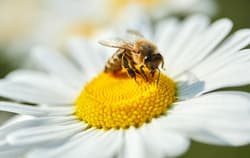During the spring and summer months, many local homeowners will spend considerably more time in their lawn and garden areas. Often, paper wasps, yellowjackets, honey bees, and other types of stinging insects will form large nests in these residential environments. Residents are always encouraged to proceed cautiously around nests filled with stinging insects.
Have you encountered a nest containing bees on your property? Today, properly trained pest control technicians understand how to safely handle residential bee removal. The best course of solving these problems begins by contacting a local pest control company regarding an inspection. That’s why American Pest Solutions should be your first call.
We Owe A Lot To The Little Honey Bee
One of the most common types of bees found in residential settings is honey bees, which have a golden-brown appearance and bodies that measure roughly ½ of an inch long. As social insects, honey bees will form nests or colonies with many others, which can survive for multiple years.
Honey bees are extremely helpful creatures for the environment and the economy. These creatures assist with the pollination of many plants.
Property owners in Western Massachusetts who are in their yard area during the warmer months of the year often encounter honey bee nests in locations, including voids in trees, crevices in exterior walls or siding, or below logs or other debris. Those who abruptly disturb a honey bee nest may find themselves the target of a swarm of aggressive flying creatures.
The Buzz On Bee Stings: Risks And Allergic Reactions
Why is it important for homeowners with an active nest on their property to contact a local specialist for bee control in Western Massachusetts? Bees are flying creatures that will deliver a painful sting.
Most of those who endure a bee sting experience mild symptoms including instant pain and red and short-term, swollen areas of the skin. Some individuals will endure moderate symptoms, such as swollen skin that worsens and persists for several days. In severe cases, people will struggle with more significant reactions such as difficulty breathing, hives, or nausea and require prompt medical attention.
DIY Bee Removal In Western Massachusetts Is Dangerous
Which of the various stinging insect control options sold by local home improvement stores are the most effective? Many property owners in the Western Massachusetts area who are operating with the best of intentions mistakenly try do-it-yourself home pest control products that are marketed by retailers. Many of these options, including sprays, traps, and others, fail to deliver the intended results.
Most of these store-bought bee control solutions represent general " one-size-fits-all " options. Unfortunately, problems involving bees and other stinging insects in residential settings are unique; therefore, creating a truly customized treatment plan is critical.
Another significant concern associated with DIY options to treat types of stinging insects is personal safety. Some individuals underestimate how bees will aggressively defend their homes. Aside from enduring multiple painful stings, those with allergies are particularly vulnerable to bee stings and may experience adverse reactions.
Call The Experts For The Safe Removal Of A Bee's Nest
Are you looking for answers regarding how to remove bees from your property? For efficient bee hive removal services in the Western Massachusetts area, homeowners are encouraged to consult with a qualified pest management expert for assistance. The pros operate according to the best safety standards when handling problems with stinging insects.
The team of seasoned pest management technicians with American Pest Solutions provides effective bee removal services for homeowners in the Western Massachusetts region. Our organization is familiar with bees and other insects and employs a qualified entomologist. For comprehensive solutions to a variety of pest-related concerns, local property owners should contact our office today for help.

